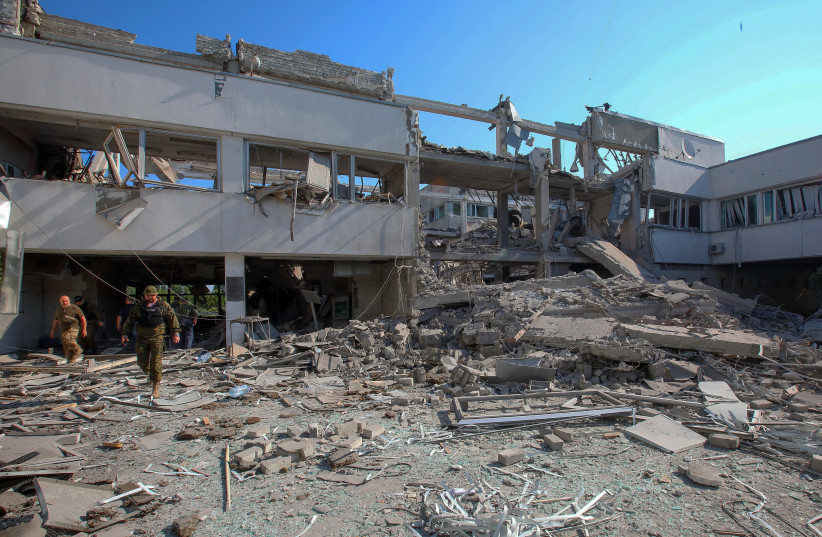The EU’s chief diplomat, Josep Borrell, said on Monday he is hopeful that a deal to allow Ukraine to resume wheat exports through its Black Sea ports will be signed this week. Borrell said in a press conference in Brussels that Moscow must let Ukraine export wheat or else, in the eyes of the international community, Russia will be seen as a country that uses “food as a weapon without any consideration for human beings’ lives. “It’s not a diplomatic game. It’s an issue of life and death for many human beings,” Borrell continued.
For more stories from The Media Line go to themedialine.org
The announcement comes after Russian and Ukrainian officials met in Istanbul last Wednesday to discuss the issue under the mediation of the UN and Turkey. Russia and Ukraine together account for around a third of global wheat exports, and the Middle East is the main consumer of the Russo-Ukrainian wheat. A quarter of the wheat
eaten in Egypt comes from Ukraine; in Libya, around half of the wheat comes from Ukraine,
and in Lebanon, more than 60% of the wheat is Ukrainian.

“It’s not a diplomatic game. It’s an issue of life and death for many human beings."
Josep Borrell, EUs chief diplomat
Jihane Boudiaf, a senior economic and risk analyst at S&P Global Market Intelligence, told The Media Line that the Middle East and North Africa (MENA) countries which were the most vulnerable before the war began have suffered the most from the global drop in the supply of wheat.
“The impact of food shortages is higher on those MENA countries who had already been
suffering significant political instability and/or economic vulnerability, which include
countries like Yemen, Syria, and Lebanon,” she said. Mohamad Radwan Al Omar, president of the Lebanese Assembly for Inclusive Development and representative adviser of Lebanon for MediateGuru’s Global Advisory Board, said Middle Eastern countries have been looking for alternatives to Ukrainian wheat since the war began.
However, he told The Media Line, they are still not close to securing sufficient supplies. He explained that countries in the Middle East, specifically Egypt, Lebanon, Iraq, Morocco, Tunisia, and Algeria, are threatened with a serious problem, as their heavy reliance on Russian and Ukrainian wheat will be difficult to replace from other markets.
Kaitlyn Rabe, research director at Mondo Internazionale and sociological and political consultant at Minter Group, said that even if the agreements to resume Ukrainian exports are signed, there are numerous issues that will need to be considered before shipments can begin, issues that will take an unpredictable length of time to resolve.
It will depend on a series of factors throughout the wheat supply chain, Rabe told The Media Line, “within the port, the numbers of employees who are still willing and able to work on the ships, and it will also depend upon the on-the-ground military situation which is highly volatile and unpredictable.” Boudiaf said that once a deal is signed and Ukraine starts exporting wheat again, Turkey could be one of the first countries to receive it.
“It is very likely that Turkey will be prioritized, at least at the initial stage, given that it is the Turkish navy that will be demining the Ukrainian ports and escorting vessels to and from the ports,” she said.
Al Omar noted that Ukraine, in its difficult situation, will need to sell the wheat to the countries that can afford it first.
“As we all know, in today's new world order, and yesterday’s world order too, ‘de facto’
money has always had its priority, especially for the ones that need it the most,” he said. He
added that Ukraine will need a lot of money to fix what the war has destroyed. “They will need to adopt new restructural policies in order to stand up again, in which they will be seeking to rely on their natural resources like wheat and use it in the best, most profitable way that serves their nation first. But it all depends on the outcome of the war,” Al Omar added.
Boudiaf said that if the deal is signed and endures, it will be an important factor in seeing prices in global markets decrease. She added, however, that “it will likely take some time for local markets to feel that change and for consumers to benefit from it.” That will also depend on local market practices, she explained, “whereby, for instance, retailers could engage in stockpiling to avoid potential future shortages, at the beginning at least, which means that prices might remain elevated for consumers.” Rabe added that market dynamics could also delay the impact. “It would definitely be a relief in terms of the quantity of food available,” she said.
However, she added, that there is “some evidence from the UN Conference on Trade and Development that a large part of the reason for food prices’ sharp increase worldwide is actually due to the market’s speculative reaction to the conflict, rather than due to an actual lack of grain, so I won’t express certainties as to the possible change in prices.” Al Omar noted that for now, many MENA countries are taking measures in an effort to make it through the crisis.
As for Lebanon, he says that “a few months ago, bakeries started limiting the amount of pitas that every individual can take, starting from three portions, until last Saturday when it decreased to one portion.”
He added that the lack of governmental support has caused the prices to soar. “The price of portions already increased from 1,000 Lebanese liras to 30,000 L.L., and in the black market it could reach a minimum of 50,000 L.L.”
